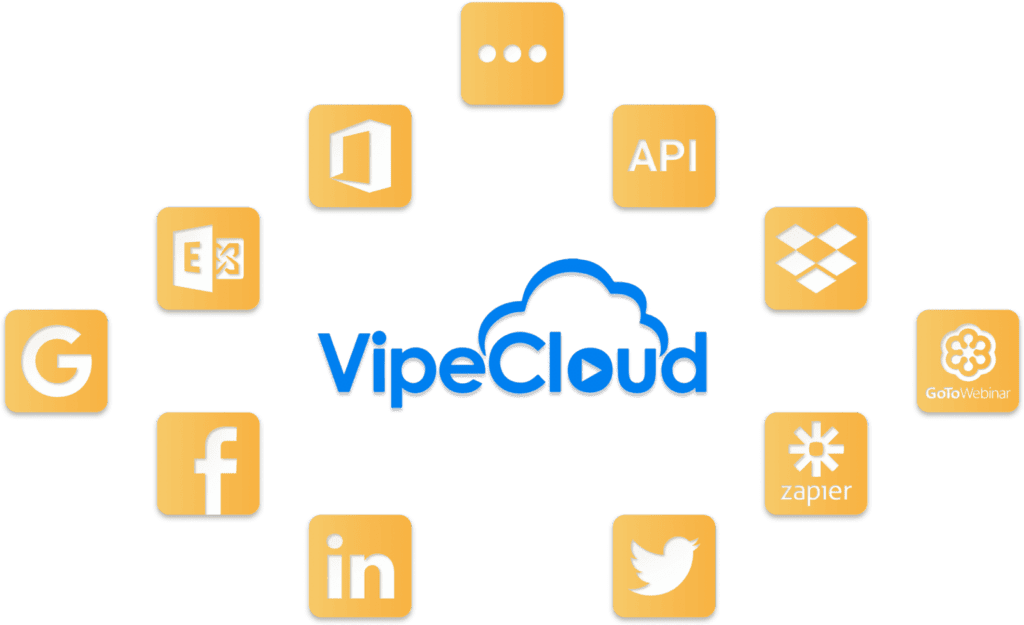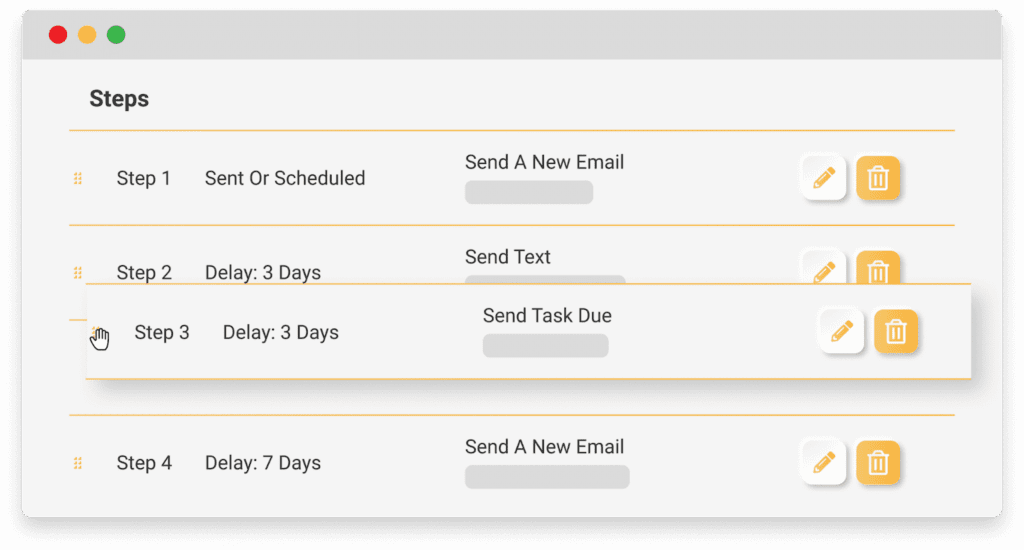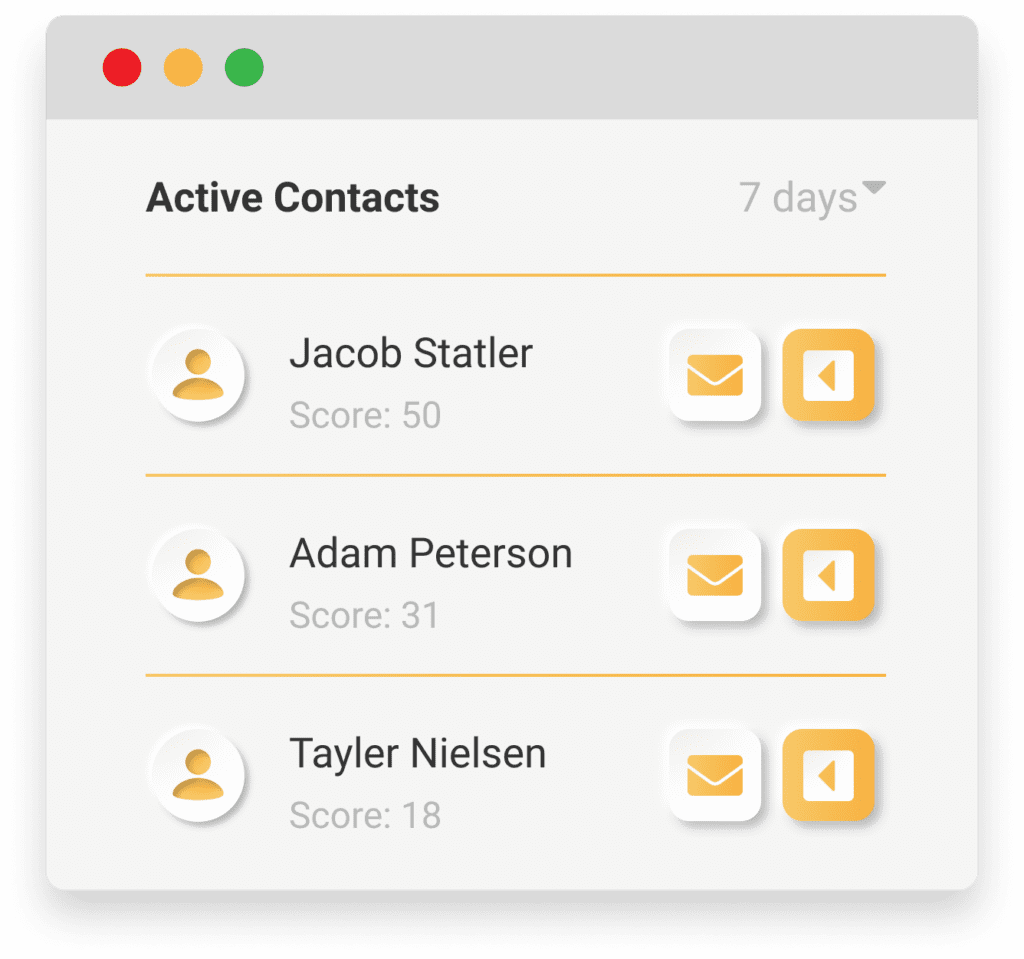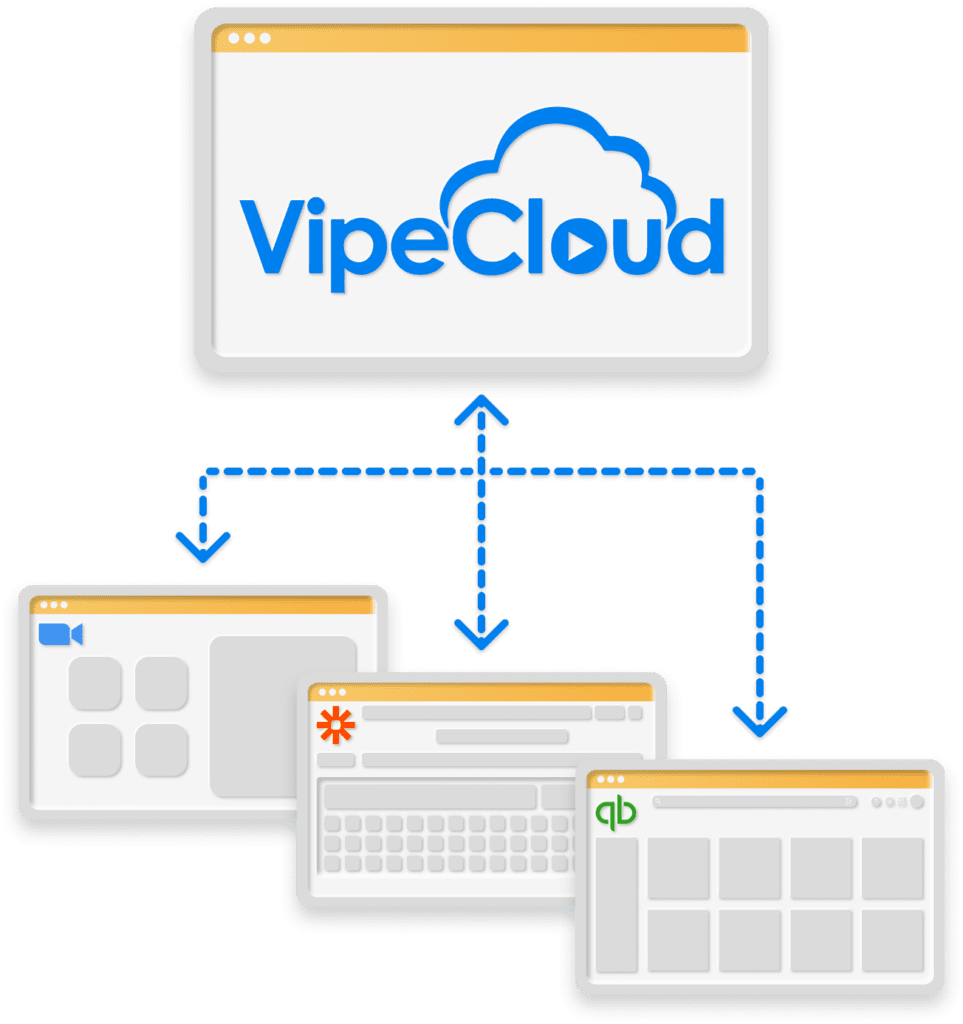Last updated on August 7th, 2023

This buyer’s guide will help you decide on which CRM is best for your small business.
Marketing, sales, financial management, customer service, and more…
Small businesses of today have to do a lot to remain competitive.
The #1 way of handling all these moving parts has been using CRM.
But what should you look for in a CRM when choosing one?
How does a busy business owner or stakeholder pick the best CRM with all these options?
In this guide, I’ll answer these questions in depth.
Table of Contents:
- Is CRM Useful For Small Businesses?
- 10 Hallmarks Of The Best Small Business CRMs
- Best CRMs for Small Businesses
- Which CRM Is Best For Small Business And Why?

VipeCloud is the only Automation tool your small business needs to
be the hero to your customers.
With Email, Texting, Social, Suites, Chat, Stories, Video Email & Sign Up Forms fully built-in, we provide you with the perfect platform to grow your business.
15 Day Free Trial – Get started risk free. No CC needed.
Is CRM Useful For Small Businesses?
CRM is beneficial for small businesses since it helps track growth metrics more accurately (sales velocity, revenue, CLV, cycle length, etc.).
Your CRM metrics significantly affect how you make decisions, and good or bad decisions can compound across weeks and quarters.
If you’re a solopreneur or have a small team, CRM makes it easier to do more with fewer “helping hands,” through automation.
Automation can save you time in numerous ways, like sending essential emails on a particular day or scheduling task reminders for your busy schedule.

Only 50% of businesses with fewer than 10 employees use CRM software.
This is because many small businesses settle for using alternatives such as spreadsheets because they’re under the impression that CRM is hard-to-use and expensive.
However, this isn’t the case for all small business CRMs.
And this is for 2 reasons:
- Many all-in-one CRMs are easy to use.
- CRM vendors can help you learn the ropes through demos, online training, resources, and documentation (to help you avoid hiring a CRM consultant).
CRM is more affordable than ever, making it one of the most no-brainer software tools for the small business market today.
Let’s now shift gears to the 10 aspects of the ideal CRM system.
Our 10-Point Checklist For Choosing A CRM For Your Small Business
1. Customizability – The degree to which a CRM can be tailored to your business and operations. The more customizability, the better since the CRM adoption likelihood from your team increases.
2. Key Automation – CRMs should allow you to create effective workflows and automation that saves time. Without automation, less may get done in a given week, month, and year. With less being done, Inefficiencies can compound, creating hefty opportunity costs.
3. Data Security – Your CRM should be secure since it houses so much company information, from customers’ data to possible trade secrets. Security ensures the longevity of your business and trust from customers and partners.
4. Affordability – Your CRM should be built for small businesses and affordable. A great price increases the likelihood of your long-term ROI.
5. CRM Vendor Support – Training, walkthroughs, how-tos, blogs, all of these should be provided by your vendor. Leverage their resources to fill CRM knowledge gaps across your team.
6. Simple To Use Tools – Simple-to-use CRMs help also help increase adoptability. They also require less training, helping your team get started even faster.
7. Incredibly Versatile – Versatility means the ability of a CRM to meet multiple needs of your business. From all things marketing and sales to customer service and team management. Look for versatility as a CRMs scalability potential.
8. New Updates – The best small business CRMs go through updates and introduce new features to their end-users. VipeCloud does this to keep small businesses on the cutting edge with CRM.
9. Scalability Potential – Top CRMs scale with small businesses by introducing different featured tiers. These tiers should give access to more tools and offer more use cases.
10. Integrations – Small businesses that choose the right CRM can have their CRM communicate with their other software. Integrations go hand in hand with customizability potential.
7 Best CRMs for Small Businesses
In this section, I’ll go over 7 CRMs for small businesses and dissect what you can expect out of each one.
1. VipeCloud

VipeCloud is a cloud-based CRM that was made to unite small businesses with various marketing, sales, and customer relationship-building tools.
It’s known for its easy-to-use features and consistent customer service.
And get this:
98% of customers have rated VipeCloud 4+ stars regarding value for their money.
This means an overwhelming majority of end-users are getting a clear ROI.
Who is VipeCloud best for?
It’s best for small businesses who need an easy-to-use CRM at a low cost.
It’s also perfect for those new to CRM who need top-tier customer support.
Many customers choose VipeCloud after growing frustrated with their old CRM’s poor customer support.
Features & Integrations
Marketing

- Sign up forms
- Email automation
- Newsletters
- Text message automation
- Social sharing
- Stories
- Segmentation
- Email verification
- Video email
Sales

Integrations

- Quickbooks
- Zapier
- Social platforms
- Zoom
- API integrations
Cost
VipeCloud’s pricing offers plans starting as low as $20 per month. Then upwards of $225+ for customized CRM solutions (60,000 contacts). You get a 15-day initial free trial with the CRM, which doesn’t require a credit card.
User Experience & Support
VipeCloud’s excellent user experience and support begin the minute you book a demo.
CRM experts walk you through how the CRM works, answer questions and even teach you how to train your team.
If you’re coming from a previous CRM, VipeCloud can help you migrate your data into VipeCloud.
VipeCloud support is available via email and phone and provides training videos, documents, and blogs for you to soak up all the information necessary.
2. Keap
Keap is a sales and marketing CRM. It serves B2B use-cases and is built to help small businesses.
Features & Integrations
Marketing
- Email automation
- Text automation
- AutoResponders
- Forms
- Customer journey mapping
Sales
- Pipelines
- Reporting
- Lead distribution
- Quotes
- Calendars
- Contact management
Integrations
- API integrations
- Zapier
- Quickbooks
Cost
Keap is between $129 and $199 per user, billed annually (starting at 1500 contacts), and offers a 14-day free trial.
User Experience & Support
Keap offers 24/7 chat support and can be contacted by phone or email. In addition, there are resources like Keap academy, Keap user community, and Keap’s content library that features blogs and podcasts for users.
3. Less Annoying CRM
Less Annoying CRM offers a collaborative CRM for small businesses, focusing on simplicity.
Features & Integrations
Marketing
- Email (needs integrations for mass email)
Sales
- Pipelines
- Contact management
- Calendars
- Tasks
- Activity report
Integrations
- Google Calendar
- Mailchimp
- CallHippo
- Leads Connector
- AgileForms
- API
Cost
Less Annoying CRM’s pricing is $15 per user per month and includes a 30-day free trial. If you have 10+ seat members, you can contact them directly to get a customized solution.
User Experience & Support
Less Annoying CRM is available via email, phone, and the contact form on their website. In addition, they offer CRM demos, a beginner’s guide, and FAQs to get users started on their platform.
4. Hubspot
Hubspot is a customizable, all-in-one CRM that provides marketing, sales, and customer service solutions.
Features & Integrations
Marketing
- Email marketing
- Forms
- Landing pages
- Live chat
- Tasks
- Social media
- Multichannel marketing
Sales
- Pipelines
- Tasks
- Analytics
- Forecasting
- Sales automation
- Contact management
- Calendars
Integrations
- Gmail
- Google Calendar
- Wallee
- Mailchimp
- Lucky Organge
- GoToWebinar
- GleanQuote
Cost
Hubspot ranges from $45-$3,200 billed annually (starting at 1,000 contacts). Hubspot offers a free option — however, it does have limited capabilities.
User Experience & Support
Hubspot support can be contacted via phone, email, or live chat. They provide:
- Account managers for CRM users.
- An academy.
- How-to articles.
- A customer blog.
- A customer community.
5. Pipedrive
Pipedrive is a sales-focused CRM that applies to a variety of industries. Pipedrive also offers an email marketing tool for users who want more robust email capabilities.
Features & Integrations
Marketing
- Lead segmentation
- Contact history
- forms
Sales
- Pipelines
- Reporting
- Activity reminders
- Contact management
- Revenue forecasting
Integrations
- G Suite
- Outlook
- Trello
- Zoom
- Asana
Cost
Pipedrive ranges from $14.00 to $99.00 per user, billed annually (starting at 10,000 contacts), and offers a 14-day free trial.
User Experience & Support
Pipedrive offers 24/7 support via live chat or email. There’s also a blog, community, and learning center for end-users to navigate.
6. Bigin
Bigin is a pipeline-focused CRM built for small businesses that want to zero in on lead activity and sales targets.
Features & Integrations
Marketing
- Forms
- Phone
Sales
- Pipelines
- Pipeline activity management
- Pipeline update workflows
- Dashboards
- Communication alerts
Integrations
- Zapier
- Mailchimp
- Zoho campaigns
- Zoho Desk
- Office 365
Cost
Bigin ranges from free to $12 per month, per user, billed annually (starts at 500 contacts).
User Experience & Support
Bigin support can be contacted via email and phone across 4 different countries (based on your location). Regarding resources, users can access training videos, blogs, webinars, and quick start guides via their website.
7. Agile CRM
Agile CRM covers all things marketing, sales, and customer services related. It offers modern features for small businesses.
Features & Integrations
Marketing
- Email campaigns
- Lead scoring
- Social monitoring
- Chrome extension
- Landing page builder
Sales
- Pipelines
- Calendars
- Reporting
- Lead scoring
- Auto dialer
- Sales enablement
- Team chat
Integrations
- Zendesk
- ClickDesk
- Google Apps
- RingCentral
- Quickbooks
- Stripe
- Shopify
- Zapier
Cost
Agile CRM ranges from a free package to $65.00 billed annually (free starts at 1,000 contacts, with up to 10 users).
User Experience & Support
AgileCRM offers demos for their product and can be contacted via email (24/5) or phone. There are also weekly training workshops to showcase different aspects of CRM.
Which CRM Is Best For Small Business And Why?
CRMs of today have a lot to offer — however, VipeCloud has the best ROI for small businesses.
VipeCloud offers marketing and sales automation, integrations, forms, reports, customizability, and more.
Not to mention offering 2,000 contacts in the first tier. This is more contacts than some CRMs that charge more offer.
The Enterprise tier gives you 60,000 contacts for less than what many vendors charge for the same amount.
VipeCloud also goes above and beyond with its support and strives to keep your data secure, so your business can continually grow.
If you’re on the hunt for a new CRM, we’d love to walk you through VipeCloud’s Sales and Marketing Suite and answer any of your questions when you request a demo.
You can also claim your 15-day free trial when you sign up today.

Leave a Reply